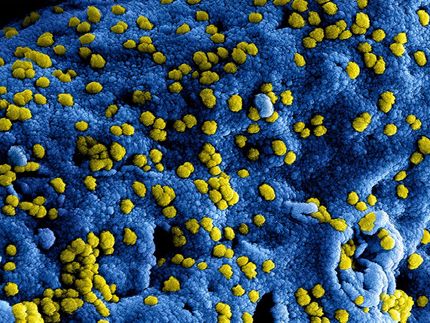Vaccine candidate against MERS coronavirus reveals efficacy in mouse model
Advertisement
The MERS coronavirus can cause severe, potentially lethal infections in human patients. An authorised vaccine is not available, so far. Researchers at the Paul-Ehrlich-Institut in collaboration with various research groups at the German Center for Infection Research (Deutsches Zentrum für Infektionsforschung (DZIF) have developed a vaccine on the basis of a measles virus vaccine strain. This vaccine is highly immunogenic and challenge experiments indicate protection of vaccinated animals.
During the development of “vaccine platforms” against emerging pathogens such as the MERS coronavirus (MERS CoV), selected genetic sequences of the pathogen are integrated into a vaccine vector, for which extensive clinical experience is available. Vaccination with such vectors induces immune response both against the vaccine vector and the pathogen’s antigen, which is encoded in the added genetic sequences. The vector vaccine thus generated can be characterised as a model and platform for other vaccines. Since the pathogen’s sequence integrated in the vaccine vector can easily be exchanged, other pathogens can be targeted on the basis of this prototypic vector vaccine’s construction. Thereby, the development of a vaccine targeting emerging pathogens during the event of sudden outbreaks of epidemics such as the current Ebola epidemic should be accelerated.
A research team that includes researchers working with Dr Michael Mühlebach at the Paul-Ehrlich-Institut (PEI), head of section “Product Testing of Immunological Medicinal Products for Veterinary Use” of the Division Veterinary Medicine and members of the research group “Oncolytic Measles Viruses and Vaccine Vectors” are currently working on such a vaccine platform. As vaccine vector or vaccine platform, the scientists are using attenuated measles vaccine viruses. Into the genome of this platform those pathogen’s genes are integrated, which shall induce the desired immune responses. The project is part of the German Centre for Infection Research (DZIF) translational unit “Emerging Infections” and is operated in close collaboration with various research groups including that of Professor Stephan Becker, Institute for Virology of Marburg University, and other sections of the Paul-Ehrlich-Institut.
After identifying the MERS-CoV as the causative agent of the mainly respiratory syndrome, which was first described in 2012 in human patients, the development of a vaccine against MERS was started on the basis of measles vaccine viruses in the PEI and the DZIF. For this purpose, the gene encoding the MERS-CoV envelope glycoprotein was inserted into the genome of a measles virus vaccine strain. The recombinant measles virus-derived vaccine thus modified was characterised and its identity and stability were demonstrated. Using this vaccine, strong immune responses in mice (development of antibodies and T-cell response) were triggered, which protected the immunised animals during infection with MERS-CoV.
“Our data indicate that such recombinant measles viruses are suitable as a platform for developing vaccines against emerging pathogens”, explained Dr Mühlebach. The developed vector vaccine is a promising candidate for a clinical trial on the road towards developing a MERS vaccine.
Previously, members of the DZIF had already participated in the identification of the MERS coronavirus. “This successful research work shows the significance of such research collaborations, which benefit from the expertise of different groups that complement each other. As a result of such work, we hope that when emerging infectious diseases occur, methods for a rapid diagnosis of the disease will be made available ad hoc, thus leading to a quick development of vaccines that effectively combat this disease”, emphasises Professor Klaus Cichutek, president of the Paul-Ehrlich-Institut.
Original publication
Malczyk AH, Kupke A, Prüfer S, Scheuplein VA, Hutzler S, Kreuz D, Beissert T, Bauer S, Hubich-Rau S, Tondera C, Eldin HS, Schmidt J, Vergara-Alert J, Süzer Y, Seifried J, Hanschmann KM, Kalinke U, Herold S, Sahin U, Cichutek K, Waibler Z, Eickmann M, Becker S, Mühlebach MD; A highly immunogenic and protective MERS-Coronavirus vaccine based on recombinant MV vaccine platform; J. Virol.; 2015























































